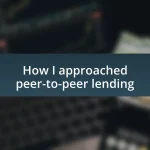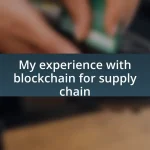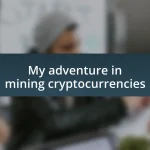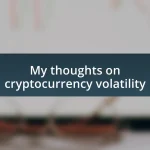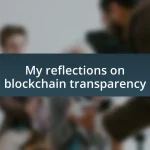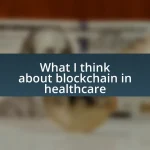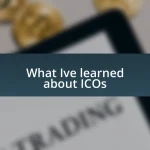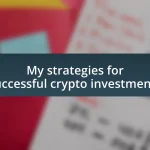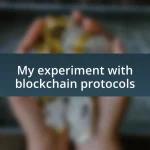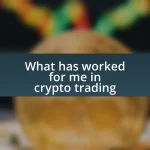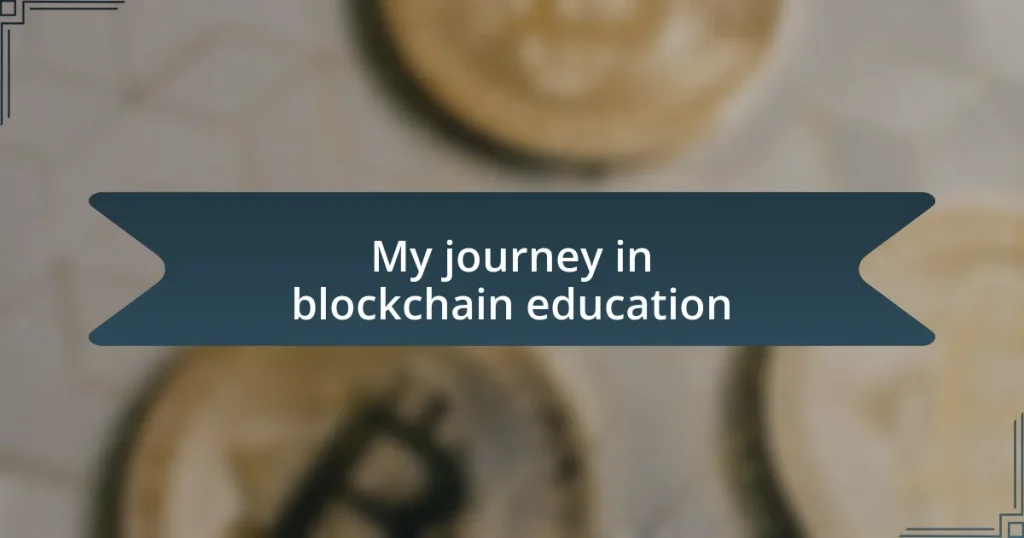Key takeaways:
- Understanding blockchain involves recognizing its decentralized and immutable nature, which builds trust in its applications.
- Engaging with various learning resources and online courses enhances comprehension and fosters community support.
- Real-world project involvement and collaboration are essential for practical knowledge application and effective communication.
- Networking and pursuing personal interests in blockchain can lead to unexpected career opportunities and growth.
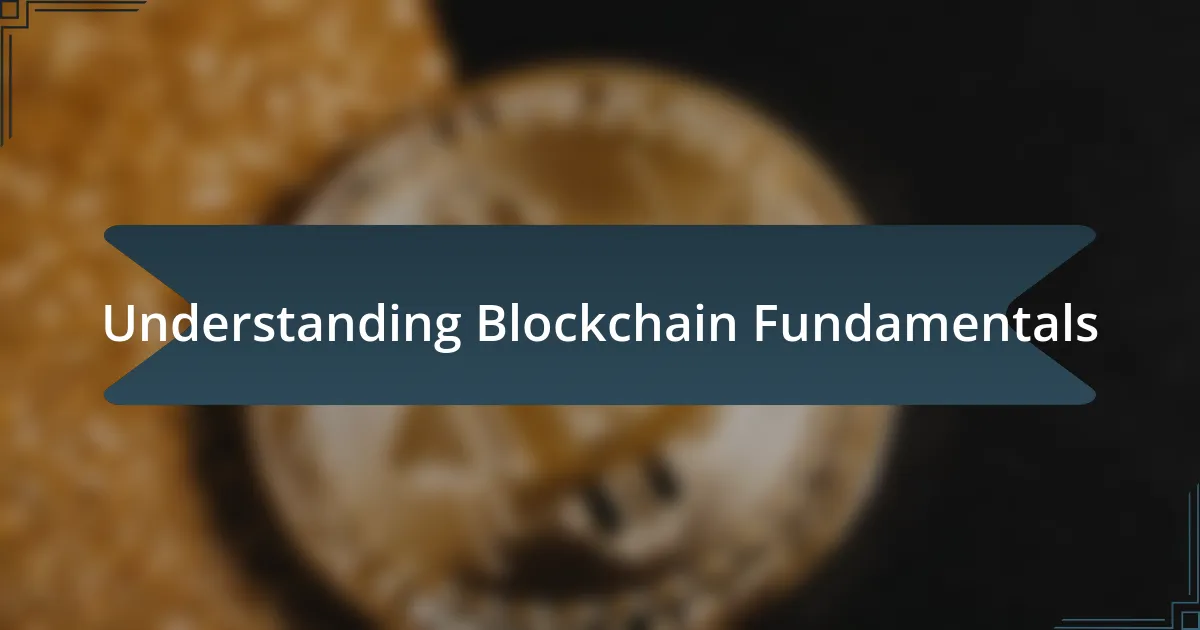
Understanding Blockchain Fundamentals
When I first encountered the concept of blockchain, it struck me like a light bulb moment. I had always thought of traditional databases as the backbone of information storage, yet here was a system that promised transparency and security through decentralization. How can a network that everyone can access maintain such integrity? That’s the beauty of cryptographic techniques and consensus mechanisms—ensuring that each transaction is verified by the community, not a single authority.
One essential aspect of blockchain is its structure. Imagine a digital ledger, where each “block” securely links to the previous one, forming an unbreakable “chain.” Reflecting on my initial confusion, I realized that this design prevents tampering. It’s like when you try to change a page in a book without leaving a trace; in blockchain, every attempt is recorded and visible to everyone. This immutability gave me a real sense of trust in a system that originally felt foreign.
As I delved deeper into the types of blockchain—public, private, and consortium—I began to appreciate the flexibility they offered for different use cases. I remember attending a workshop where we discussed how supply chains could benefit from public blockchains. Suddenly, the practical implications became clear. Can you envision tracking the journey of your food from farm to table? That idea transformed my understanding of blockchain from a mere technical tool to a revolutionary approach that could enhance everyday experiences.
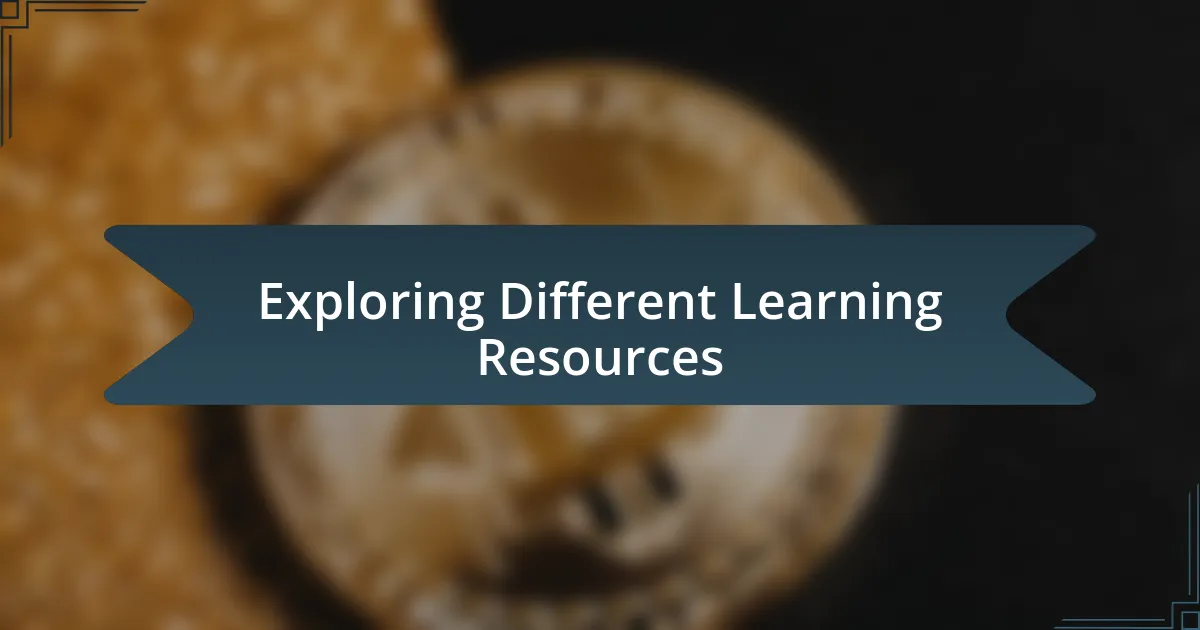
Exploring Different Learning Resources
Exploring various learning resources has significantly shaped my blockchain education journey. Early on, I found myself overwhelmed by the sheer volume of material available. I remember spending hours sifting through online tutorials and textbooks, trying to find something that resonated with my learning style. A balance of theoretical knowledge and practical application proved vital, and I discovered that not all resources are created equal. I found success in selecting those that not only explained the concepts clearly but also engaged me intellectually.
Here are some types of learning resources that I found particularly helpful:
- Online courses from platforms like Coursera and Udemy that offer structured paths.
- YouTube channels dedicated to blockchain explanations; their visual aids helped me grasp complex ideas.
- Podcasts featuring interviews with blockchain experts; I enjoyed hearing their personal stories.
- Crypto communities on forums like Reddit and Discord, where I could connect with learners and practitioners alike.
- Books that discuss both the technical and philosophical implications of blockchain technology.
By engaging with a mix of these resources, I was able to deepen my understanding and find a community that supported my growth.
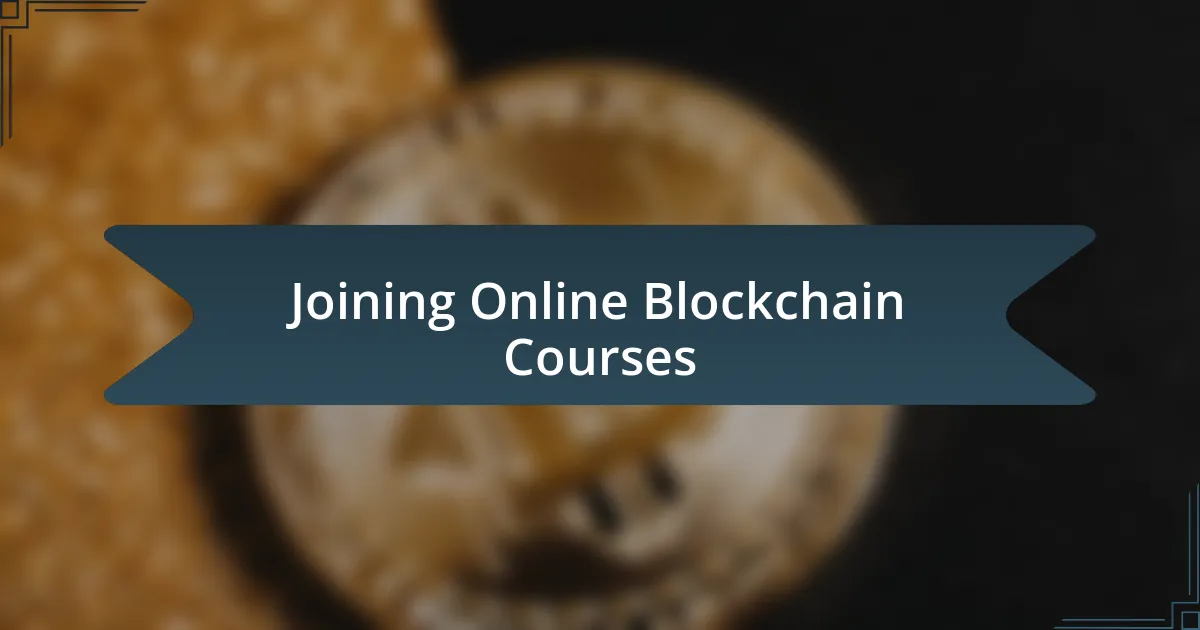
Joining Online Blockchain Courses
Joining online blockchain courses was a transformative step in my educational journey. The moment I enrolled in my first course, I felt a sense of direction that had previously been missing. I vividly remember being captivated by the interactive elements in the modules. It wasn’t just about watching videos; hands-on projects allowed me to apply what I learned, making the concepts stick.
The variety of platforms available brought about a pleasant surprise. Each course had its unique style, which catered to different learning preferences. I initially tried a beginner’s course on Coursera, where the quizzes kept me engaged and reinforced my understanding. Later, I shifted to more advanced offerings on Udemy that focused on real-world applications. This gradual progression truly enhanced my knowledge and ignited my passion for the subject.
As I dove deeper into these courses, I found myself more confident in discussing blockchain technology with peers. The supportive online communities tied to these courses became invaluable. I remember exchanging ideas and problem-solving with classmates from around the globe. It made me feel part of something bigger, a collective effort towards mastering a technology I believed had the power to change the world.
| Platform | Features |
|---|---|
| Coursera | Structured paths, quizzes, university partnerships |
| Udemy | Variety of courses, lifetime access, practical projects |
| edX | University-level material, verified certificates |
| Pluralsight | Tech-focused, skill assessments, learning paths |
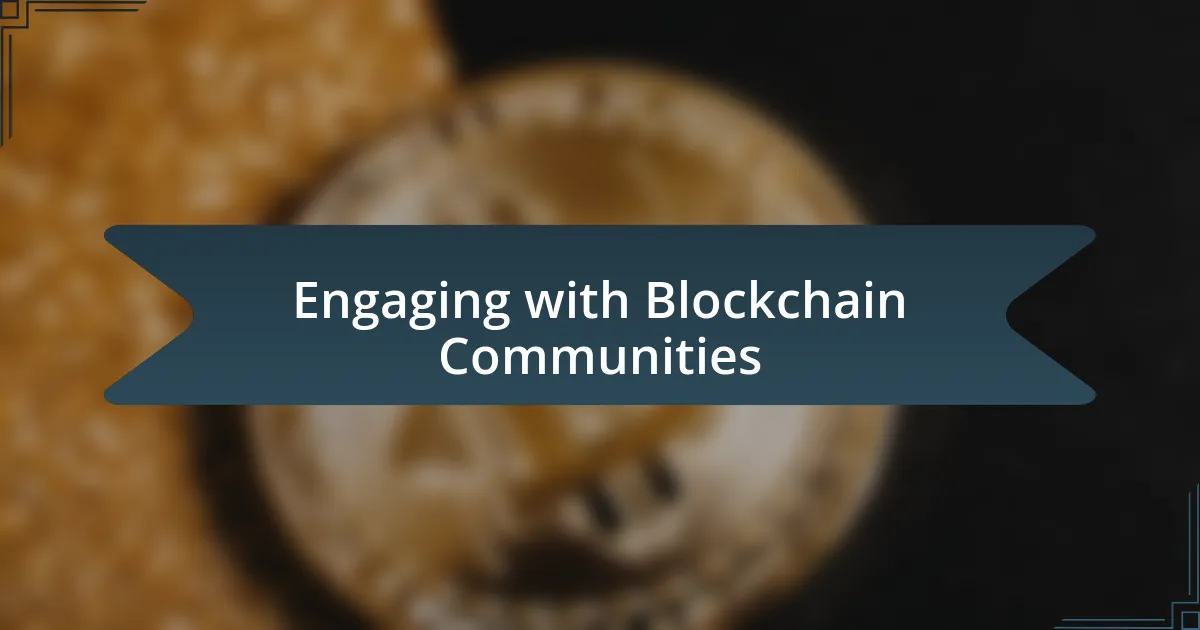
Engaging with Blockchain Communities
Being part of blockchain communities has significantly enriched my learning experience. I distinctly remember the first time I joined a forum dedicated to blockchain discussions—there was a sense of belonging that I hadn’t felt before. Engaging with others who shared my enthusiasm provided me with fresh perspectives and insights that my courses alone couldn’t offer.
One of the most eye-opening experiences was participating in a local meet-up event. As I listened to expert speakers and engaged in lively conversations, it became clear that the blockchain space thrives on collaboration. Have you ever met someone at an event whose passion ignited your own? For me, it was that moment—where ideas were exchanged freely, and connections were made, reinforcing my commitment to the community.
Online platforms like Discord and Telegram quickly became my go-to spaces for deeper engagement. I often found myself in vibrant discussions about the latest trends or troubleshooting technical challenges alongside fellow enthusiasts. It was a thrill to realize that these virtual conversations could spark genuine friendships, further motivating me to dive deeper into the world of blockchain. Such interactions transformed abstract concepts into relatable experiences, making the learning journey both enjoyable and rewarding.
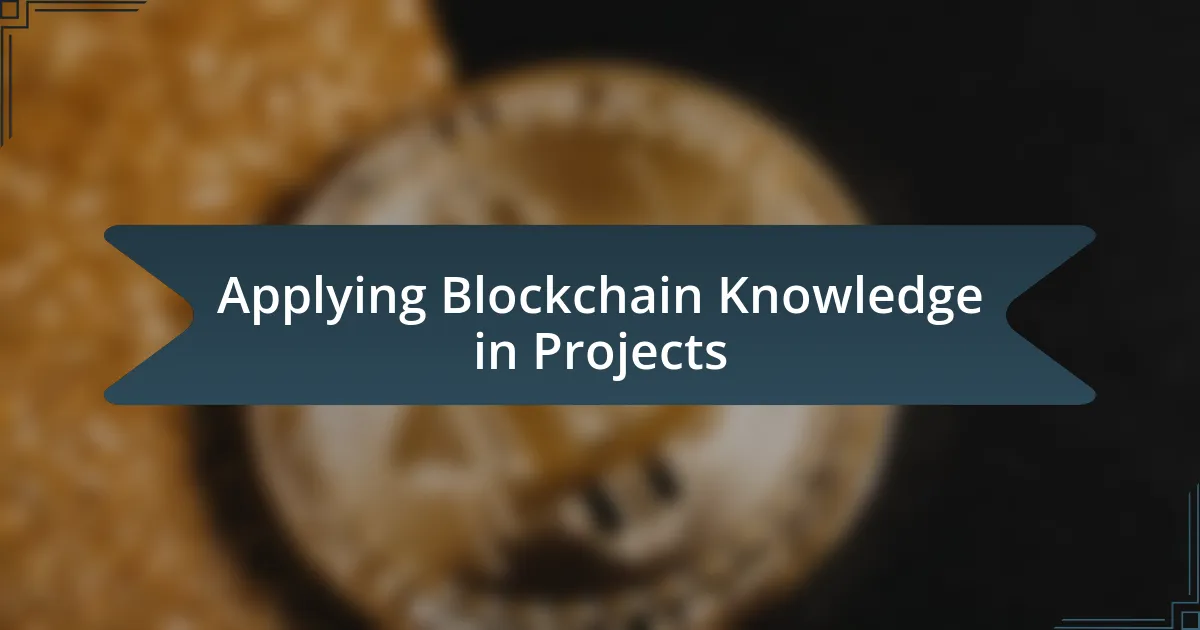
Applying Blockchain Knowledge in Projects
Applying blockchain knowledge in real-world projects is where the magic truly happens. I recall the first project I undertook, a decentralized application, or DApp, aimed at enhancing supply chain transparency. The practical application of my knowledge was exhilarating; seeing how blockchain could secure data in ways I had only read about transformed my understanding from theoretical to tangible.
One powerful lesson I learned was the importance of collaboration in these projects. When working with developers and stakeholders who didn’t share the same level of expertise in blockchain, I realized I needed to communicate complex ideas in simpler terms. Have you ever found yourself trying to explain a technical concept to a friend? It can be challenging yet rewarding to bridge that gap, and it reinforced my belief that effective communication is critical for successful project execution.
Additionally, I discovered the necessity of continuous learning. Each project presented unique challenges—whether it was integrating smart contracts or navigating regulatory requirements. It was during one such project, fraught with uncertainties, that I truly appreciated the value of my blockchain education. How else could I have navigated those rough waters? This journey taught me that applying blockchain knowledge isn’t just about technology; it’s also about adaptively leveraging what you learn in constant motion.
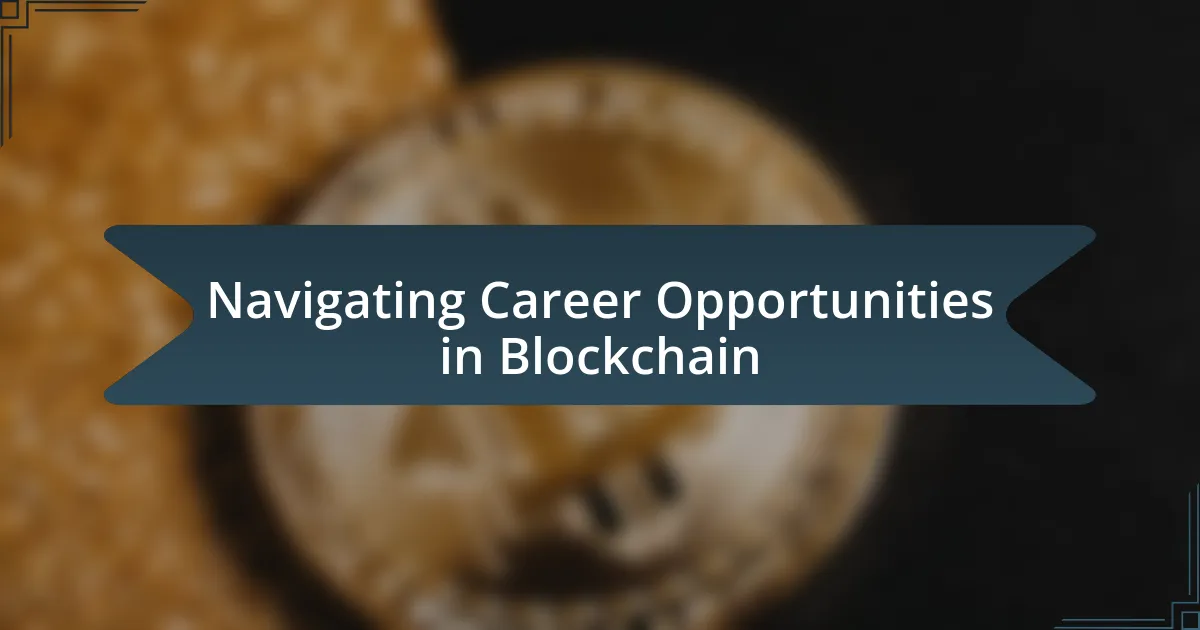
Navigating Career Opportunities in Blockchain
Diving into the blockchain sector opens up a myriad of career pathways that can be both exciting and daunting. For example, I remember when I first considered roles like blockchain developer or consultant; the options felt overwhelming. Have you ever scrolled through job listings and found yourself questioning which direction to take? I certainly did, and it helped me realize the importance of self-assessment. Evaluating my strengths and interests led me to focus on areas where I could flourish, like smart contract auditing.
As I delved deeper into the industry, I quickly understood that networking played a pivotal role in exploring opportunities. Attending meetups and conferences not only enhanced my knowledge but connected me with like-minded individuals, all eager to learn and grow. It’s fascinating how just one conversation can lead to a collaboration, isn’t it? I recall an initial interaction with a blockchain influencer that ignited a partnership on an educational project—an opportunity I would have missed without stepping out of my comfort zone.
Moreover, I noticed that feeling passionate about blockchain can open doors in unexpected ways. When I worked on a community-focused initiative to promote blockchain education, I was surprised by the interest it generated. This experience reinforced my belief that pursuing what I love can often lead to unforeseen career advancements. How often do we undervalue our passions? The journey through blockchain education not only equips us with technical skills but also helps us discover unique pathways that align with our personal values and interests.
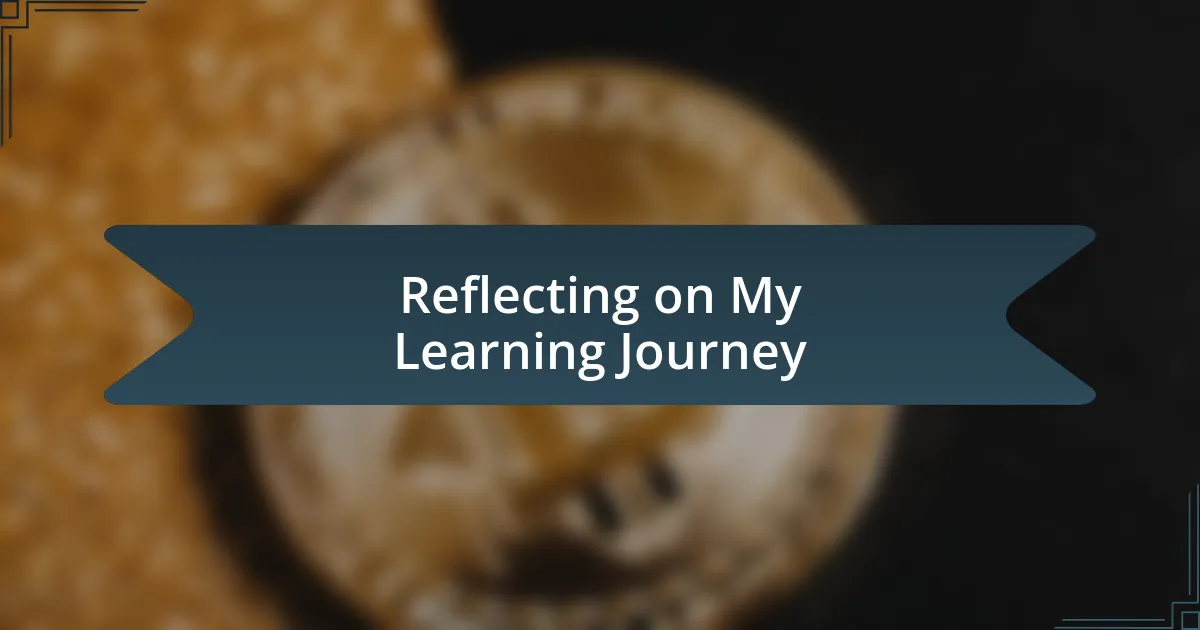
Reflecting on My Learning Journey
Reflecting on my learning journey in blockchain brings a mix of emotions. Initially, I felt like a fish out of water, trying to grasp complex concepts like decentralization and cryptography. I remember spending late nights poring over online courses and tutorials, questioning whether I’d ever truly understand it all. Yet, each small victory, like finally writing my first smart contract, fueled my determination and showed me the value of perseverance.
As I navigated this path, I discovered that mistakes can be invaluable teachers. I once tried to implement a feature in a project, only to realize it was fundamentally flawed. At first, I felt embarrassed, but it quickly turned into an opportunity for growth. Have you ever faced a setback that turned into one of your greatest learning experiences? For me, that moment was pivotal; it deepened my understanding and encouraged me to be more resilient in the face of challenges.
Looking back, I see how collaboration enriched my journey. Working with peers in study groups led to shared insights that transformed my comprehension of blockchain technology. I often find myself asking: what would I have missed without these interactions? These collaborations not only expanded my knowledge but also fostered friendships that have lasted well beyond our initial meetings. I believe this highlights the importance of community in education; we truly learn better together.

